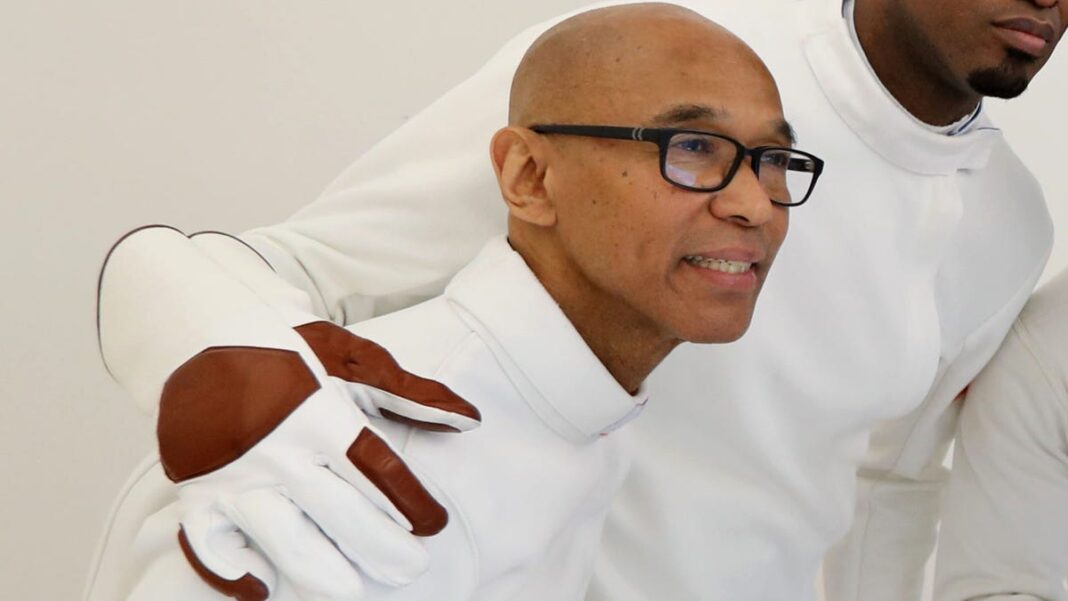Peter Westbrook, the first Black American fencer to earn an Olympic medal, has passed away at 72
Peter Westbrook, the groundbreaking first Black American fencer to win an Olympic medal and a coach who nurtured many Olympians by mentoring underprivileged youth in New York, passed away on Friday, as announced by his foundation.
He was 72 years old.
The Peter Westbrook Foundation in New York stated that the cause of his death was cancer through an Instagram post.
“It is with deep sadness that we share the passing of our Founder and CEO, Peter Westbrook…,” the post, signed by Robert Cottingham, the Foundation’s Chair, read. “Peter passed away peacefully, surrounded by family, after battling cancer bravely for a long time.”
Corinne Cater, the family spokesperson mentioned in the Instagram post, confirmed Westbrook’s death to YSL News.
In 1984, Westbrook achieved an Olympic bronze medal in saber fencing during the Los Angeles Games. This was not only a historic win as the first Black American to medal in fencing but also the first Olympic medal in fencing for an American in 24 years.
Westbrook, inducted into the United States Fencing Hall of Fame, competed in five Olympic Games, beginning with the 1976 Montreal Games and ending at the 1996 Atlanta Games.
His influence as a coach was equally significant. He founded his foundation in 1991 to support underserved communities and mentored seven Olympians over his coaching career.
Lauren Scruggs, a fencer from the Peter Westbrook Foundation, competed in the Olympics last summer and earned a gold medal in women’s team foil and a silver in individual women’s foil.
As reported by NBCSports.com, other fencers who trained under Westbrook’s foundation and went on to win Olympic medals include siblings Erinn and Keeth Smart, who secured team silver medals at the 2008 Beijing Games, along with Ibtihaj Muhammad, who won bronze in team saber at the 2016 Rio Games.
“Peter was not just a leader in our organization; he epitomized dedication to sports excellence, community service, and mentoring youth,” read the post from the Peter Westbrook Foundation, known as PWF. “His unique spirit will be deeply missed by all athletes, families, and staff at PWF. Peter’s unwavering commitment to fostering scholar-athletes was a true reflection of his life’s mission. As a thirteen-time U.S. National Men’s Sabre Champion and five-time Olympian, he set an exceptional standard for all associated with PWF.”
Beyond fencing, Westbrook also served on the Board of Directors for the U.S. Olympic Committee and shared insights about the importance of sports before both the U.S. Senate and House of Representatives, highlighting their role in personal development, self-discipline, and achievement, as noted in the Instagram post.
Westbrook was born on April 16, 1952, in Kansas City to a Black American father and a Japanese mother. After his parents separated, he was raised by his mother, Mariko Wada-Westbrook.
“Growing up in the economically challenged environment of the 1950s, he faced the civil rights unrest of the 1960s as a teenager in Newark, New Jersey,” states the Peter Westbrook Foundation’s website.
His mother encouraged him to take up fencing as a constructive outlet, which eventually led him to earn a full scholarship to New York University, where he became the NCAA champion in sabre in 1973, paving the way for his international career.
Peter Westbrook is survived by his wife Susann, stepson Dorian Miles, Sr., sister Vivian, several grandchildren, and his extended family, according to Robert Cottingham, Chair of the Peter Westbrook Foundation.
Memorial services have yet to be arranged, as confirmed by Cater, the family spokesperson.
(This narrative was updated to provide additional information.)

